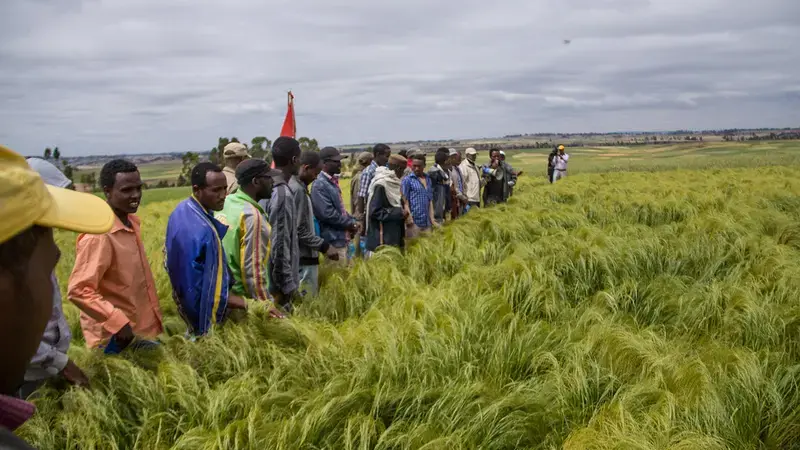Scaling-up proven technologies

Promoting and delivering new technologies and innovations to farmers – a process known as agricultural extension – helps farmers to address multiple challenges. It is also critical to enhancing productivity, improving rural livelihoods, and initiating pro-poor economic growth. However, extension is rarely a straightforward process, particularly in the dry areas, where farms tend to be limited in size and scattered across vast distances, and extension services often lack access to resources and reliable information.
In addition, increasingly complex production and market environments have exposed the limitations of conventional and more linear extension services – and the need for alternative models that strengthen farmer links to input/output markets and enhance the voice of farmers.
Flexibility and reform
Experience tells us that more flexibility is also required. Experimentation can enhance adaptation to evolving conditions such as shifts in markets, institutions, and policies. It can also help extension services take advantage of advances in ICT, which provide farmers with essential information on innovative practices, government policies, input and output markets, and credit facilities, while also providing a tool for advocacy.
A critical first step for any country or agency looking to improve its extension services is a thorough review of current practices and policies to identify where reforms are needed. ICARDA’s work in Tunisia, for instance, has involved an extensive skills appraisal of staff to help identify existing knowledge and skill gaps.
A subsequent training program has also targeted more innovation, grassroots-level delivery mechanisms such as farmer-to-farmer interactions, and more female extension agents – to help increase women’s agency and encourage them to adopt more sustainable livelihoods, a critical response to the increasing ‘feminization’ of agriculture in Tunisia and throughout the wider region.
Engaging new partners
The improved performance of extension services may also depend on partnerships with new and emerging extension actors. Partnering with the private sector is vital – given the sector’s emergence and growing relevance as a result of market liberalization reforms over the past two decades. Private sector actors are now fully engaged in input supply, product marketing, and extension services, and their presence is influencing a shift towards the commercial production of high-value crops in many countries.
Civil Society Organizations (CSOs) could play a more important role, providing effective and high-quality extension services for free or at a reasonable price, and development organizations and research institutions could apply scientific insights to help production systems shift to more commercial business models.
Forging strong partnerships with these entities, however, would mean adopting new ways of working, and developing innovative laws and regulations to support and secure the diverse services of a more pluralistic extension system. For instance, more commercially-oriented value chain approaches would require regulations overseeing investments in new technologies and their dissemination, and the establishment and development of agri-businesses; and new partnerships would need codes of ethics and contractual agreements specifying the rights and duties of each partner.
Evaluating extension models
ICARDA works with its partners to test and evaluate different extension models that identify the most efficient and effective approaches. One initiative in Tunisia – ‘Mind the Gap’ – works with barley-livestock farmers and uses randomized control trials (RCT) to compare the effectiveness of different combinations of technical, economical and organizational training in the dissemination of an improved barley variety and feed blocks.
The initiative targeted 280 women, who were either the members - or in a minority of cases - the heads of farming households. Analysis revealed that just over half of these households adopted the new barley variety. But, those receiving the full package – which included female empowerment support such as entrepreneurial training and information sessions on access to credit and subsidy programs– were more likely (61 percent) to adopt the variety than those who only received technical, economic and organizational training (49 percent).
‘Mind the Gap’ also explored the effectiveness of text messaging. Survey results revealed that that 87 percent of participating households appreciated the messages, and some 70 percent acted on the advice provided when adopting the improved varieties and feed blocks. The results suggest that although SMS messaging can never replace farmer-to-farmer interactions, they can be an inexpensive complimentary service when extension resources are scarce.
Improving extension and seed delivery in Ethiopia
RCTs are also being used to identify effective crop extension models in Ethiopia. Working across a total of 98 villages, an initiative is analyzing different combinations of the following measures: enhancing the communication and facilitation skills of extension agents, increasing the intensity of demonstration skills, and delivering seed packages of varying sizes – given that conventional 50 kg bags are often prohibitively expensive for farmers or too large for their small land holdings.
Preliminary results suggest that the availability of smaller seed packages has had a positive and significant effect on adoption. Responses to the other measures, however, are expected to become apparent after the second cropping season as there is often a time lag between the acquisition and processing of information and its utilization in decision making.
